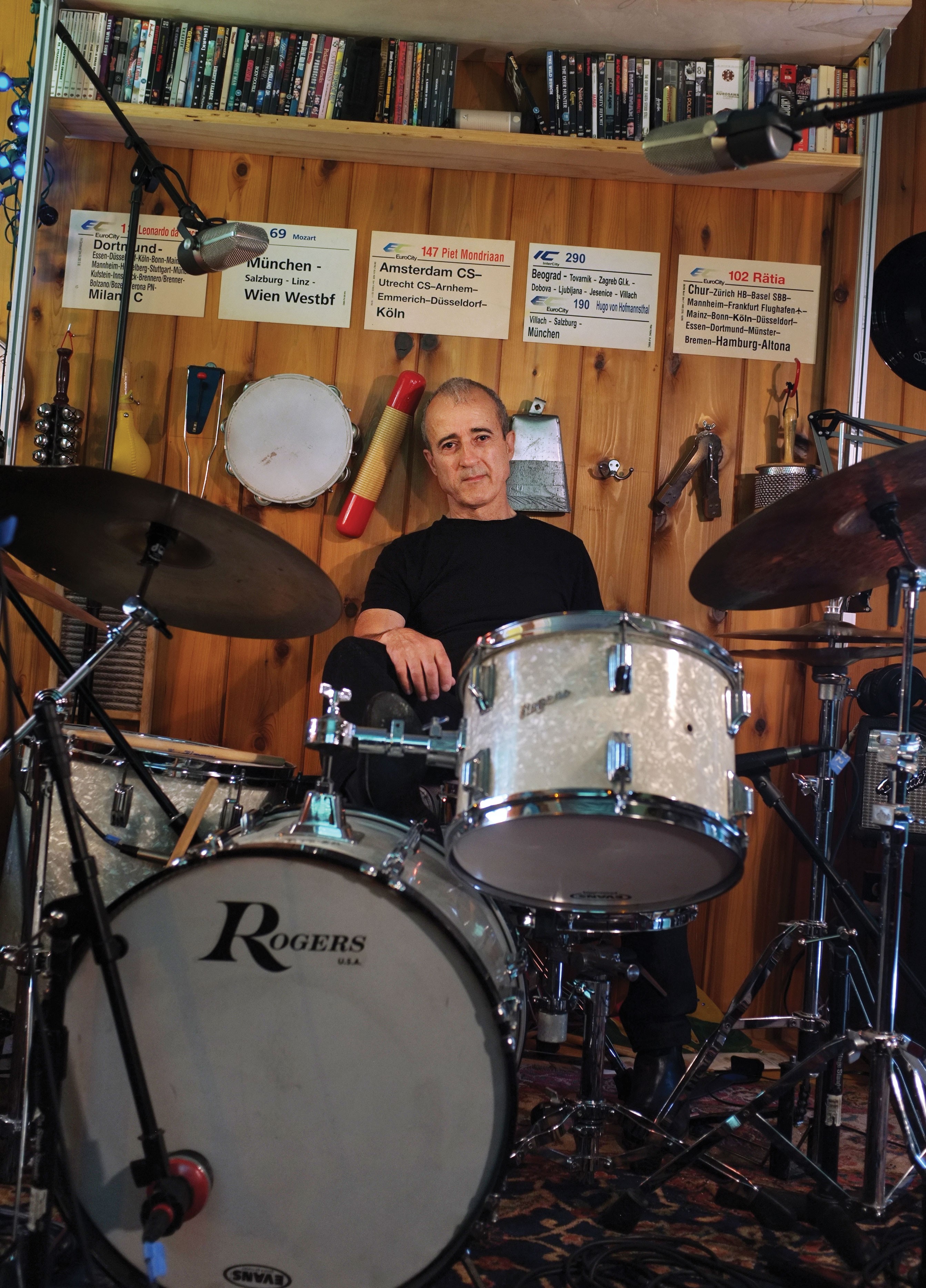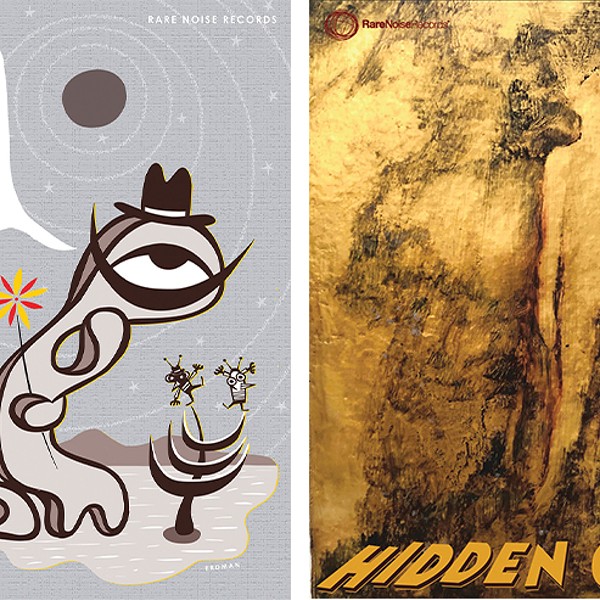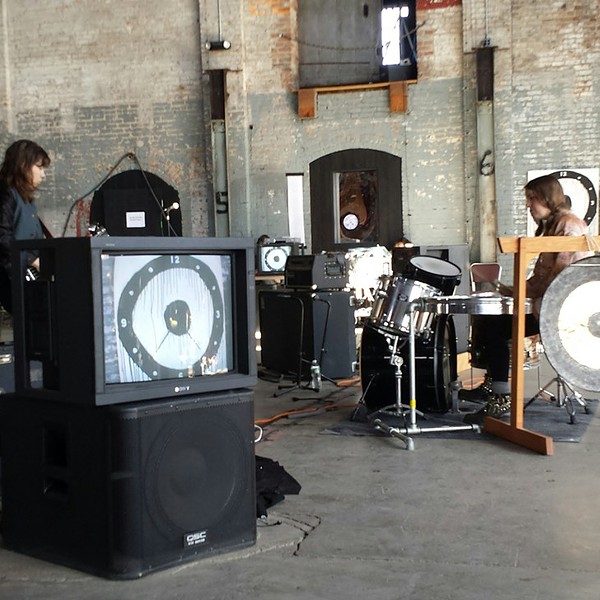During periods of peak flow, almost six million cubic feet of water crash over Niagara Falls every minute. The noisiest area directly below the three separate waterfalls has been measured at 95 decibels, which, in the centuries before electronic amplification, made it one of the loudest spots on Earth. And, even today, if you stand next to this breathtaking site long enough the constant white noise can begin to feel deafening. But as the terrain fans out around the falls and you move further away, the sound changes. Especially after dark, when the manmade racket of the day has died down.
"At night there's this steady, low roar that's always there," says drummer and composer Bobby Previte, who grew up roughly 40 blocks from the falls. "When I was a little kid, the first time we went on a family a trip, I got really freaked out at night because it was totally quiet around the place we were staying. I asked my mom, 'Where's the sound?!' And she had to explain to me that what I was missing was the sound of the falls, and we'd hear it again when we were back home. I'd been hearing it every night since I was born, so I just thought the sound of the falls at night was the sound that night made. I'm sure that sound is in my music."
Doubtless it is, among many other astounding sounds. Previte, 63, is equally revered for his magical skills as a musician and the constantly surprising works he produces as a composer of ensemble, film, dance, and theatrical scores. A list of the names who've drawn on his talents stretches from John Adams to John Zorn. Over his nearly four-decade professional career, his innovative rhythms, bold arrangements, and deep aural palette have crossed and re-crossed the boundaries between jazz, classical, avant-garde, R&B, straight-up rock, and electronic music.
Niagara Falls' culture centers, literally, on rushing water. But when it came to music, Previte's early home life was dry as a bone. "My family was the opposite of a musical family. We didn't even have a record player," the drummer recalls. "But since I was raised Catholic, I did hear music at church and at weddings. Eventually I started listening to the radio, which back then [the 1950s] wasn't the narrow thing commercial radio is today, where they play the same 10 tunes every hour. So I just became totally infused with R&B, blues, soul, and rock 'n' roll." Previte picked up acoustic guitar and made his stage debut at age five, singing "Hound Dog" at a local talent show. When he was in his early teens, however, his attention shifted to his cousin's shiny new drum set. "His family was better off, so he always got everything he wanted," says Previte. "But he let me sit down and play his drums one day and it just felt like home." The aspiring percussionist pieced together his own rat-rod drum set using rusted garbage cans, aluminum pie plates, and other found items and formed a cover band, the Devil's Disciples. The group, oddly enough, landed its first gig at a church—only to be fired before playing a note when the officials saw Previte's junkyard kit. Undaunted, he saved enough money from his paper route to purchase his first "real" set (still in his home studio today) and kept practicing, inspired by his early heroes, Ringo Starr, Ginger Baker, Mitch Mitchell, Jethro Tull's Clive Bunker, and King Crimson's Michael Gilles. "Then I started reading about and discovering all of these jazz guys—Buddy Rich, Louie Bellson, Cozy Cole," he explains. "But my folks were dead-set against me becoming a musician. My dad actually died without ever seeing me play. I remember coming home one night from a gig my band had done and showing him the money I'd made—$3! [Laughs.] He and my mom were more excited about me being the first kid in the family to go to college, to become a dentist."
The University of Buffalo was close by and affordable, but it was soon clear that dentistry was never going to be something Previte could sink his teeth into. "I was miserable," he moans. "But, looking back decades later, going to school there was the exact right thing for me to do." In the 1970s, the University of Buffalo's campus was a crossroads of contemporary music in the US. Among others, its guest lecturers and faculty at various times included the composers John Cage, Tony Conrad, Lejaren Hiller, Morton Feldman, and Jan Williams. Previte studied under Williams, a pioneer of new approaches to percussion performance, and was indelibly impacted by his precepts. "Through Jan, I became fascinated with percussion ensemble music," says Previte. "I saw that in certain modern music percussion had been emancipated, going from instrumentation that had largely been seen for centuries as the 'spice,' or accompaniment, for other instruments to something unto itself. Something that had an unlimited pallete. For me that was like the moment in The Wizard of Oz when everything suddenly goes from black and white to color. My foundation was in psychedelic rock. But after hearing stuff like Varese, Charles Mingus, the Art Ensemble of Chicago, [free jazz drummers] Sunny Murray, and Jerome Cooper, there was no turning back."
In 1979, Previte's newfound direction took him to New York, another case of "landing in the right place at the right time." The city's downtown was just then beginning to blow up with a new generation of experimental jazz players. Previte clicked in right away, and went to perform at avant-incubator the Knitting Factory and other vital venues and recording in various bands with saxophonist John Zorn, guitarist Elliot Sharp, keyboardist Wayne Horvitz, and others. "It was exhilarating," says Previte. "I'd started writing in Buffalo because when I was there I couldn't find other stuff I wanted to play. But for the first few years I was in New York I made a conscious decision just to play for a while and soak it all in." The move paid off when it came time to compose for his initial albums as a leader. Bump the Renaissance (1985, Soundaspects Records), Dull Bang, Gushing Sound, Human Shriek (1986, Koch Jazz Records), Pushing the Envelope (1987), Claude's Late Morning (1988), and Empty Suits (1990; the latter three all Gramavision Records) won him devout praise for his challenging compositions—on top of his formidable playing and telekinetic exchanges with his fellow musicians. Another mid-`80s career spike came when producer Hal Willner suggested him to Tom Waits, who was then looking for inventive players to create his now-legendary album Rain Dogs (1987, Island Records). Out of the sessions came "Clap Hands," which features a very prominent marimba track by Previte. "I made it up when we were recording the tune," the percussionist recounts. "When Tom was mixing the record later, he ended up making it the signature part."
The 1990s saw a deluge of albums released under Previte's own name and by such acclaimed Previte-organized groups as Empty Suits, "avant bar band" Latin for Travelers, and the propulsive Weather Clear, Track Fast, further raising his profile as one of creative music's most vital drummers and band leaders. The period also brought a bit part in Robert Altman's 1993 film Short Cuts (his second screen role after "The Mute Marine," a hilarious 1986 sketch with William Shatner on "Saturday Night Live") and an ambitious 1991 stage score for the Moscow Circus that combined electronic and acoustic instrumentation. He performed on the studio recording of composer John Adams's mini-opera "I Was Looking at the Ceiling and Then I Saw the Sky" (1995) and continued to tour and record in various settings—Euclid's Nightmare, a 1997 duet with Zorn on the Depth of Field label is an oft-cited standout—as he developed his trademark compositional style: layered, impressionistically directed, sonically diverse constructs with lots of room for both his well-chosen side players and their instruments to breathe and be themselves. Another major influence on Previte's approach was Miles Davis's 1970 milestone Bitches Brew (Columbia Records). "Bitches Brew absolutely changed my life," he says. "It showed me how the music really exists in the cracks, not always so much in the notes." The drummer assembled an 11-piece, Bitches Brew-themed band called the Horse to play the Knitting Factory's Tap Room, and it's that project that begat his ongoing, locally based Voodoo Orchestra.
His steadiest collaborators, alongside Horvitz and guitarist Charlie Hunter (Previte is also the drummer of the Charlie Hunter Trio), include saxophonist Skerik and keyboardist/multi-instrumentalist Jamie Saft. "Bobby always approaches every composition he plays with a fresh perspective," says Saft, who was profiled in the February 2014 issue of Chronogram and has worked with Previte in the septet Coalition of the Willing and the heavy metal-fusing "doom jazz" projects the Beta Popes and Swami LatePlate. "Playing with him, it always feels like there are endless possibilities; as if the smallest seed can grow into an entire garden." At the time of this writing, Saft and Previte are touring Europe with bassist and fellow Hudson Valley resident Steve Swallow in the dream-team trio the New Standard, whose self-titled debut was recently issued on RareNoise Records.
Previte and his spouse, the writer and performance artist Andrea Kleine, moved into a bungalow outside Hudson in 2013 and quickly felt at home. "The scene in New York was getting more and more disparate, and we really wanted to be somewhere in the country where we could reconnect with a sense of community," says Previte, the recipient of a 2012 Guggenheim Foundation fellowship and other prestigious grants. "[The Hudson Valley] has really been a great place for meeting cool people and finding great musicians to play with." Previte found four such musicians right down the road: the members of celebrated ensemble So Percussion, who are the codirectors of the Bard College Conservatory of Music's percussion department and were enlisted by the drummer to perform his newly released five-part masterpiece suite Terminals (Cantaloupe Music; the recording also features guest solos by Wilco guitarist Nels Cline, keyoboardist John Medseki, harpist Zeena Parkins, and saxophonist Greg Osby).
"The first phrase that comes to mind when I think about Bobby is 'pure energy,'" says So Percussion's Eric Cha-Beach. "As a working musician he has the ability to imagine sounds clearly before they actually happen, which not every composer is good at. And he's really focused on what's best for the music. He was never afraid to stray from his score and change the parts when we trying things out in rehearsal."
Previte's success with both playing music and writing it begs the question: If he had to choose between the two outlets, which would it be? He winces. "I guess the answer would be 'drummer,' because that way I could still compose as I played—I don't really like the process of composing," he confesses. "But I love hearing the results."
Terminals is out now on Cantaloupe Music. BobbyPrevite.com.




















